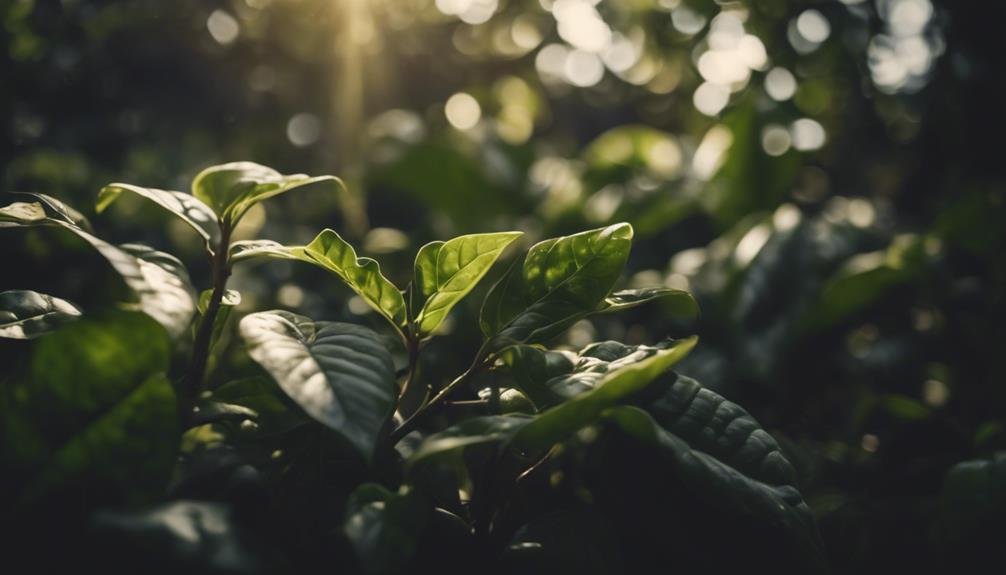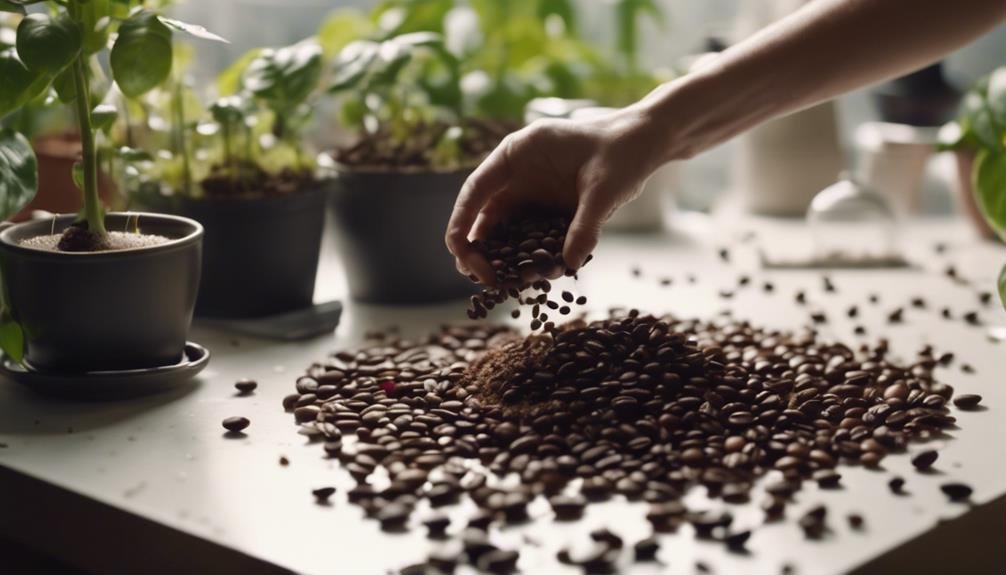To excel in cultivating coffee plants, you must first decide between Arabica and Robusta varieties. Arabica offers a smoother taste, while Robusta packs a higher caffeine punch.
Ensure your plants thrive in a humid environment with temperatures ranging from 60-70°F and receive gentle, diffused light. Proper airflow is essential to prevent mold growth, and remember to water your plants with at least 6 inches of water per month. Opt for well-drained, loamy soil enriched with organic matter, aiming for a pH level around 7.
Before planting, soak your coffee seeds for 24 hours and germinate them in moist vermiculite. Once the seeds sprout, transfer them to pots while maintaining the optimal conditions for growth. This detailed process is crucial for the successful cultivation of your coffee plants.
Let's delve deeper into each step to ensure your coffee plants thrive and produce the best beans possible.
Types of Coffee Plants

When considering growing coffee plants, you'll discover 124 different species globally, with Arabica and Robusta being the most popular choices. Arabica is favored for home cultivation due to its smooth flavor and aromatic qualities, while Robusta offers a stronger, more bitter taste with higher caffeine content.
Both varieties can thrive in a controlled greenhouse environment. Selecting the right species is crucial. Arabica plants need more delicate care, whereas Robusta plants are hardier and more pest-resistant.
Choosing the appropriate type of coffee plant can help you connect with fellow coffee enthusiasts who share your passion.
Ideal Growing Conditions
To cultivate optimal conditions for coffee plants, maintain a moist, humid atmosphere with temperatures ranging from 60 to 70 degrees Fahrenheit.
Ensure your coffee plants receive gentle, indirect light to avoid harsh direct sunlight.
Adequate airflow is crucial to keep the plants cool and dry, preventing issues like mold.
Mimic natural rainfall by providing a monthly water supply of at least 6 inches.
Here's a simple checklist for you:
- Keep the temperature between 60-70°F
- Provide consistent, diffused light exposure
- Water the plants with at least 6 inches monthly
Optimizing the Environment

To optimize the growth of your coffee plants, it's essential to create an environment that suits their specific requirements. Coffee plants thrive in moist and humid conditions, with temperatures ranging between 60 and 70 degrees Fahrenheit.
It's important to ensure there's moderate airflow to keep the plants cool and dry, while also providing diffused light instead of direct sunlight. Mimicking natural rainfall, make sure to water the plants with at least 6 inches of water monthly to support their growth effectively.
Soil Requirements
To ensure your coffee plants thrive, start with well-drained, loamy soil rich in nutrients and organic matter. Enhance the soil quality by adding peat moss for moisture retention and improved aeration, cow manure for essential nutrients, and bone meal for vital phosphorus.
Aim for a soil pH around 7, testing before transplanting to ensure optimal conditions. By providing the right soil foundation, you set the stage for a successful journey in growing coffee plants.
Seed Preparation Steps

Before planting, it's beneficial to soak your coffee seeds for 24 hours to improve germination. This simple step increases the likelihood of successful sprouting.
After soaking, place the seeds in moist vermiculite and use burlap or coffee sacs for the germination process. Maintain a humid and warm environment to mimic the natural conditions where coffee plants thrive.
Germination may take anywhere from 2 to 6 months, so patience is essential. Once your seedlings grow to 24-36 inches in height, transfer them to pots. Plant each seed 1 ½ inches deep in well-drained, loamy soil.
Conclusion
When you delve into the art of growing coffee plants, you embark on a journey that beautifully mirrors the intricacies of life. By understanding the different types of coffee plants, creating optimal growing conditions, and enriching the soil, you cultivate not only coffee but also patience and dedication.
As you witness your plants thriving, you'll also notice personal growth within yourself. This rewarding process not only deepens your connection to the simple pleasure of a homemade cup of coffee but also teaches valuable lessons about nurturing and perseverance.
In nurturing your coffee plants, you nurture a part of yourself as well, fostering a sense of appreciation and fulfillment that goes beyond just a delicious brew.












